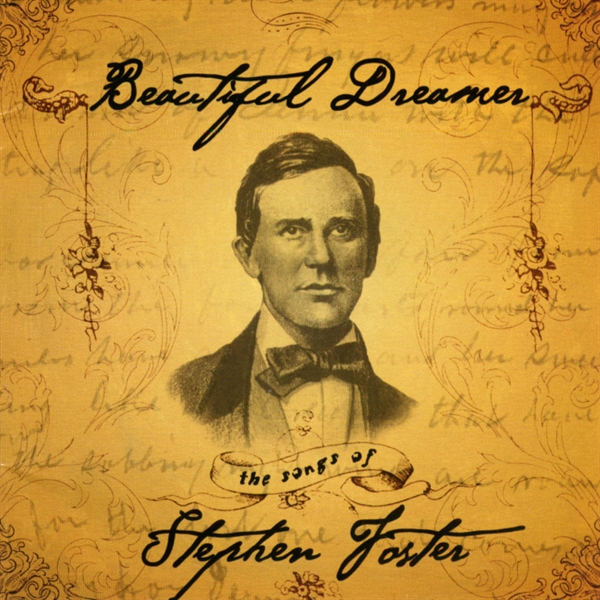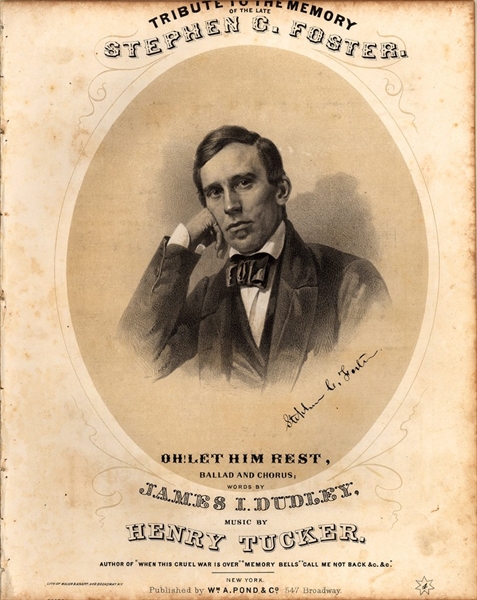Stephen Foster Day 2025 is on Monday, January 13, 2025: What Stephen Foster tune encourages racing enthusiasts to "bet on de bay"?
Monday, January 13, 2025 is Stephen Foster Day 2025. Oh! It's National Stephen Foster Day! Six years later, Foster moved

"Camptown Races"
De Camptown ladies sing dis song, Doo-dah! doo-dah!
De Camptown race-track five miles long, Oh, doo-dah day!
I come down dah wid my hat caved in, Doo-dah! doo-dah!
I go back home wid a pocket full of tin, Oh, doo-dah day!
Gwine to run all night!
Gwine to run all day!
I'll bet my money on de bob-tail nag,
Somebody bet on de bay.
De long tail filly and de big black hoss, Doo-dah! doo-dah!
Dey fly de track and dey both cut across, Oh, doo-dah-day!
De blind hoss sticken in a big mud hole, Doo-dah! doo-dah!
Can't touch bottom wid a ten foot pole, Oh, doo-dah-day!
Chorus
Old muley cow come on to de track, Doo-dah! doo-dah!
De bob-tail fling her ober his back, Oh, doo-dah-day!
Den fly along like a rail-road car, Doo-dah! doo-dah!
Runnin' a race wid a shootin' star, Oh, doo-dah-day!
Chorus
See dem flyin' on a ten mile heat, Doo-dah doo-dah!
Round de race track, den repeat, Oh, doo-dah-day!
I win my money on de bob-tail nag, Doo-dah! doo-dah!
I keep my money in an old tow-bag, Oh, doo-dah-day!

how did stephen foster make the transition to a distinct american style?
Foster had made it his business to study the various music and poetic styles circulating in the immigrant populations of the new United States. His intention was to write the people's music, using images and a musical vocabulary that would be widely understood by all groups. Foster worked very hard at writing, sometimes taking several months to craft and polish the words, melody, and accompaniment of a song before sending it off to a publisher.
Rather than writing nostalgically for an old South (it was, after all, the present day for him), or trivializing the hardships of slavery, Foster sought to humanize the characters in his songs, to have them care for one another, and to convey a sense that all people--regardless of their ethnic identities or social and economic class--share the same longings and needs for family and home. He instructed white performers of his songs not to mock slaves but to get their audiences to feel compassion. In his own words, he sought to "build up taste...among refined people by making words suitable to their taste, instead of the trashy and really offensive words which belong to some songs of that order." Stephen Foster was a man with a mission, to reform black-face minstrelsy, then the most pervasive and powerful force in American popular culture.
At first, Foster wrote ballads and dances for parlor singers and pianists as well as minstrel songs, often referred to as "Ethiopian" songs, for professional theatrical performers. The minstrel songs, like the ballads, had simple melodies and accompaniments, but their texts, written in dialect, depicted African-American slaves as simple, good-natured creatures. Some of his earliest minstrel texts even had crude caricature and terms, i.e. "Away Down Souf" (1848) and one verse that was later deleted form "Oh! Susanna."
But as Foster grew more ambivalent about the earlier "Ethiopian" songs, he began offering a different image, that of the black as a human being experiencing pain, love, joy, even nostalgia. "Nelly Was a Lady" (1849) is an eloquent lament of a slave for his loved one who has died, apparently the first song written by a white composer for the white audience of the minstrel shows that portrays a black man and woman as loving husband and wife, and insists on calling the woman a "lady," which was a term reserved for well-born white women. "Angelina Baker" (1851) similarly laments a slave who has been sent away by "old Massa." "Ring, Ring de Banjo!" (1851), despite its apparent surface of frivolity, has the slave/singer leaving the plantation "while the ribber's running high," a reference to escaping while the bloodhounds could not pick up his scent, and traveling to freedom on the Underground Railroad. "Old Folks at Home" (1851), better known as "Swanee River," which was to become the most popular of all Foster's songs, conveys a sentiment that had almost universal appeal -- yearning for lost home, youth, family, and happiness. Increasingly, the "Ethiopian" songs used the same musical style that Foster created for his parlor ballads.
Foster informed Christy that -- as we would put it today -- he was trying to reform minstrelsy by writing texts suitable to refined taste, instead of "trashy and really offensive words," and that certain of his songs should be performed in a pathetic, not a comic style. (By "pathetic," Foster meant "to engender compassion.") Foster also began using the term "plantation song" for his new compositions, many of which were gentle an nostalgic in text with music that hinted of Irish or Italian ancestry. Soon he dropped dialect altogether from his texts and eventually referred to his songs as "American melodies." The verse-chorus structure of these songs made them suitable for both the minstrel stage and the parlor.
During this period, Foster also turned his hand to instrumental music aimed very specifically for the parlor. The "Social Orchestra," published in 1854 by Firth, Pond, & Co., was a compendium of 73 arrangements for flute, violin, piano, and other instruments. The selections ranged from operatic -- including thirteen tunes by Donizetti -- and classical -- Jullien, Abt, Mozart, and Schubert -- to popular airs, including his own. The collection was ideal for informal home entertainment; the arrangements lent themselves to various combinations and numbers of instruments and included many tunes for dancing, a favorite parlor pastime. The collection proved to be very popular, but for Foster it was not a money-maker. He received a flat fee of only $150 from the publisher, which may explain why this was his only venture into instrumental arranging.

Classical:Can you suggest me some Folk artists similar to Steven Foster?
Stephen Foster was not a folk artist. He was a professional songwriter who specialized in 'regional' music, music originally intended for theatre and musical touring groups, and his music became popular as many early folk musicians made variations of his lyrics their own.
As to folk artists, the most popular and best known would have to be Woody Guthrie. Other American folk music composers and performers would include Tom Paxton, Lead Belly, Alan Lomax. Pete Seeger and Jelly Roll Martin. Later folk singers and composers included Joan Baez, Peter, Paul & Mary, The Kingston Trio, Phil Ochs, The Seekers, etc.
EDIT: Technically, Foster wasn't a folk artist. Yes, he wrote folk music but there is no record of him personally ever performing the music himself publicly, which is how most people define folk artists or rock artists or jazz artists. If anything, we can call him a folk songwriter. In fact, he's considered the father of American folk music.







